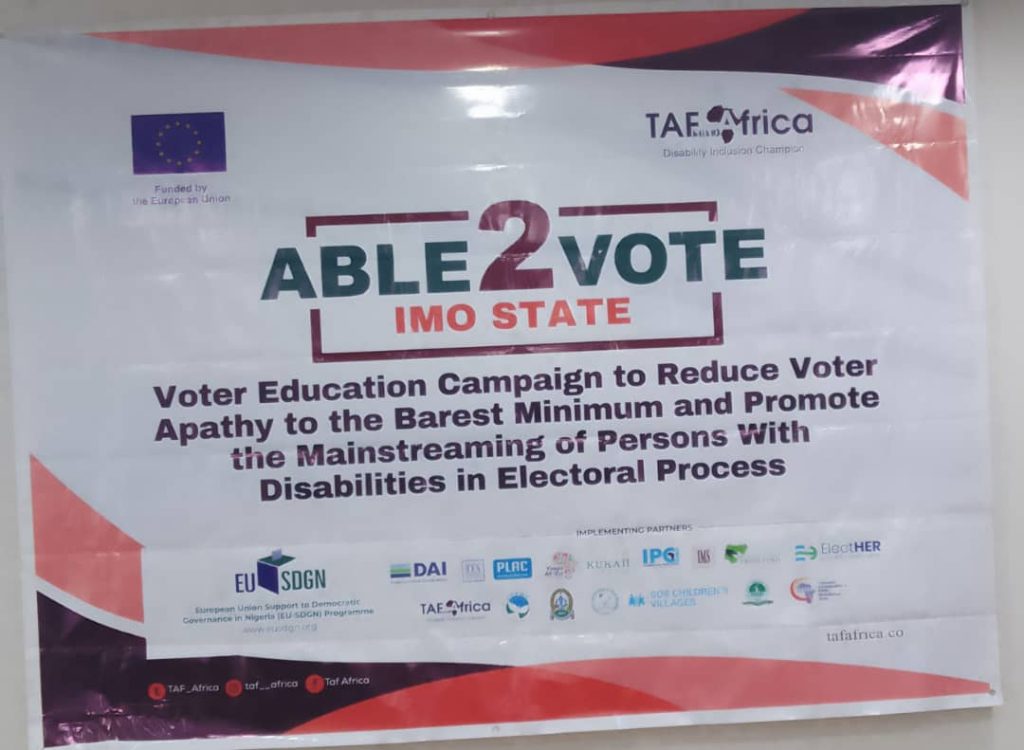Ugo Nosiri, Owerri
Persons With Disabilities, PWDs, under the aegis of Joint National Association of People with Disabilities JONAPWD want the Independent National Electoral Commission, INEC, to ensure ease of accessibility and safety of their members in the November 11 off-cycle election.
They also want the government to implement the 5% slot of employment under the Person’s Living with Disabilities Act and stop all forms of discrimination against them.
They made the call during a Voter Education campaign organised by TAF AFRICA, a non-governmental organisation aimed at reducing voter apathy to the nearest minimum and promoting the mainstream of PWDs in an election.
The chairman of JONAPWD in Imo state, Doctor Stanley Nwachukwu, decried the fact that their members are marginalised and not carried along in election matters, both to vote and to be voted for.
“Our people have put in efforts to make sure they are carried along in the scheme of things, but our efforts have not been enough. Our people are qualified, we have doctors, lawyers, people that have the capacity to hold any position. We have all it takes, but they will marginalise us; they will not give us equal opportunity to contest and challenge the able bodied.”
Dr. Nwachukwu urged their members to put in their best efforts to ensure they participate in actions, so that they can make themselves relevant while performing their civil responsibility.
“If you say you are physically challenged and you will not go out and vote, and the other person says the same. In Imo State, we have over 54,000 persons with disabilities, and by the time we all decide not to vote, the able bodied will vote in their choice.”
The representative of the Head of Department Voter Education and Publicity at Imo INEC, Mrs Emmanuella Ben-Opara, in her address, noted that INEC had since 2019 elections provided aides to polling units to assist the PWDs.
Listing out some of the efforts the commission has made to ameliorate the discomfort of the PWDs during elections, Mrs Opara said “At the point of registration, INEC tries to find out how many persons per polling unit has any form of disability. The Commission deploys magnifying glasses and braille ballot papers to such polling units. INEC also makes such polling units are not upstairs for ease of accessibility for those on wheelchairs.”
“We also train our ad-hoc staff to leave others and attend to PWDs.”
Earlier, The Programme manager TAF Africa, Mr. Samuel Layemi, explained that the workshop was organised to sensitide the PWDs on the need to participate in elections, know their rights and the provisions INEC has made to ensure they participate in the November 11 elections with ease.
Mr. Layemi said the workshop also aims to hear the PWDs share their experiences from former elections which would help make a significant impact for future elections.
“To ensure that they all go out to vote and take the message to other members of their clusters, to increase awareness of the need to participate in election processes.”
He said that one of the missions of the non-governmental organisation is to ensure that “governments at all levels have at least one person with disability as a member in each of their cabinets. Disabled community should not be left out.”
The TAF AFRICA Programmes manager went further to advocate accessibility for persons with disabilities into places of worship and offices and the engagement of sign language interpreters in every function.
The workshop had in attendance PWDs from different clusters, the visually impaired, the deaf, the albinos community and others.

